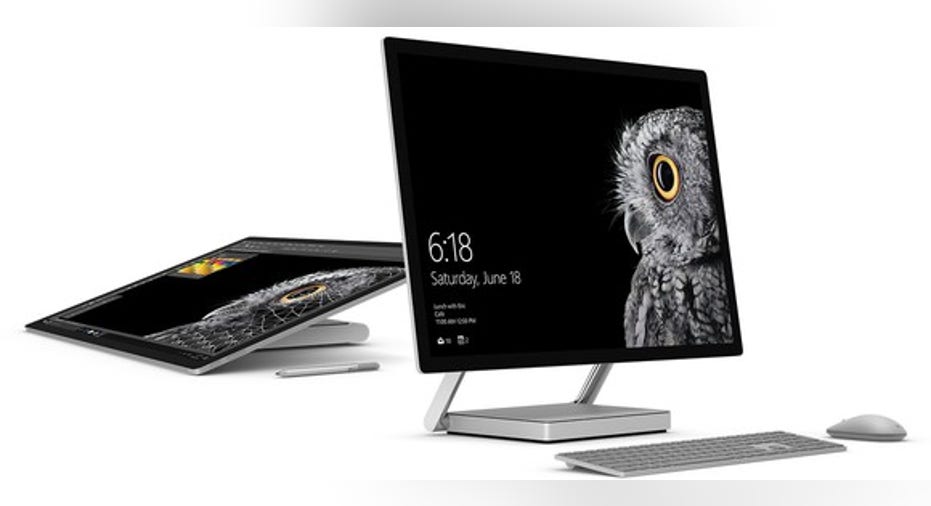Microsoft Corporation's Surface Studio Is Exceeding Expectations

In late 2016, Microsoft (NASDAQ: MSFT) released its first all-in-one desktop computer lineup known as the Surface Studio. The systems represent essentially ultra-premium Windows-based all-in-one computers with price tags to match (the systems start at $2,999 and go up from there).
Image source: Microsoft.
At the price points that Microsoft is asking, these systems were never going to be particularly high-volume products. However, per a recent report from DigiTimes, demand for these systems is better than expected.
30,000 in the fourth quarter of 2016
The report claims that initial unit shipment estimates for the Surface Studio systems during the fourth quarter of 2016 were just 15,000 due to their high price points. However, DigiTimes says that shipments "may reach 30,000 units based on orders," citing "Taiwan-based supply chain makers."
For the first quarter of 2017, DigiTimes says, again citing those supply chain sources, Microsoft "has ordered 30,000 units to be shipped in the first quarter of 2017."
Some perspective
In terms of the overall desktop personal computer market, it doesn't look like the Surface Studio is capturing much unit share. For example, DigiTimes says that Apple ships between 3.5 million and 4 million iMac computers (all-in-one PCs) per year, and is the second largest all-in-one vendor after personal computer giant Lenovo.
At a run-rate of around 30,000 units per quarter -- or approximately 120,000 units per year -- Microsoft's share of the worldwide all-in-one desktop computer market, let alone the worldwide desktop computer market, just doesn't look like it'll be all that high.
As far as the potential financial impact to Microsoft is concerned, even if we assume Surface Studio average selling prices of around $3,500 across 120,000 units, Microsoft is potentially looking at $420 million in incremental annual revenue.
That's certainly not bad, but considering that Microsoft is expected to have generated about $94 billion in revenue during 2016 and is predicted to take in about $100 billion in 2017, that's just not a big deal to the software giant's financials.
Furthermore, it is likely that Microsoft's margins on the Surface Studio products are much lower than its corporate average (Microsoft is, after all, primarily a software company, and personal computer margins aren't generally all that high as the barrier to entry is so low). As a result, the gross profit/operating profit contribution from such system sales is likely to be much lower than the revenue contribution to Microsoft.
Over time, if Microsoft can ramp shipments significantly from current levels, then it could become much more interesting. However, the market for such highly priced personal computers is necessarily small, and it wouldn't be a surprise to see Microsoft's partners ramp up their efforts in the ultra-premium all-in-one PC market in a bid to protect their share in this market.
Investment takeaway
With its home-grown notebooks, tablets, and all-in-one desktops, Microsoft's hardware division is clearly trying to open some easy revenue streams by capturing some share in the large (albeit shrinking) personal computer market.
It's not a bad strategy for Microsoft, as it's all pretty much upside for the company (assuming that the product development costs aren't out of hand), but it comes at the expense of revenue and profit dollars that would otherwise be going to its partners in the personal computer ecosystem.
10 stocks we like better than Microsoft When investing geniuses David and Tom Gardner have a stock tip, it can pay to listen. After all, the newsletter they have run for over a decade, Motley Fool Stock Advisor, has tripled the market.*
David and Tom just revealed what they believe are the 10 best stocks for investors to buy right now... and Microsoft wasn't one of them! That's right -- they think these 10 stocks are even better buys.
Click here to learn about these picks!
*Stock Advisor returns as of Nov. 7, 2016
Teresa Kersten is an employee of LinkedIn and is a member of The Motley Fool's Board of Directors. LinkedIn is owned by Microsoft. Ashraf Eassa has no position in any stocks mentioned. The Motley Fool has no position in any of the stocks mentioned. The Motley Fool has a disclosure policy.



















